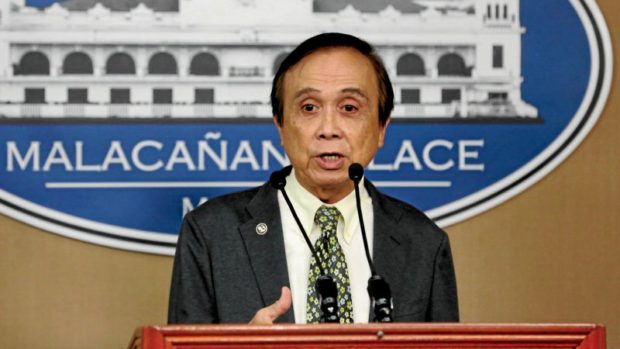Higher food, fuel prices pushed August’s inflation to 3-month high of 3.1%

Socioeconomic Planning Secretary Ernesto M. Pernia (File photo by JOAN BONDOC / Philippine Daily Inquirer)
Inflation rose 3.1 percent in August, the fastest in three months, partly due to higher food, fuel and power prices coupled with a weaker peso, the government reported Tuesday.
The latest Philippine Statistics Authority (PSA) data showed that headline inflation last month jumped from 1.8 percent a year ago and 2.8 percent in July.
The rate of increase in prices of basic goods last August matched the 3.1 percent posted in May.
In a statement, the state planning agency National Economic and Development Authority (Neda) said food inflation increased 3.7 percent in August from July’s 3.4 percent “mainly due to faster price increases in vegetables, fish, corn, flour, bread, and other cereals.”
“One cause is Typhoon Jolina last month, which affected agriculture in Central Luzon, particularly in Aurora,” Socioeconomic Planning Secretary and Neda chief Ernesto M. Pernia explained.
Non-food inflation also inched up 2.7 percent from 2.4 percent a month ago “due to faster price adjustments in transport, housing, recreation and culture, communication, restaurants, water, and electricity and gas,” Neda said.
“Higher domestic petrol prices, particularly unleaded gasoline, diesel, kerosene, and liquefied petroleum gas, mainly caused higher inflation in the transport sector,” Neda added.
According to Pernia, “the continuing surge in domestic petrol prices, coupled with depreciation in the peso-dollar rate, may exert upward pressures on inflation, leading to increases in the cost of electricity, gas, and other fuels in the near term.”
The peso further slid to 11-year low levels last month, breaching the 51:$1 mark.
Also, “the disruption of economic activities in the United States triggered by Hurricane Harvey might also temporarily impact global economic activity, dampen supplies of energy, and push world oil prices up,” according to Neda.
“The impact of Hurricane Harvey on US oil production could exert upward pressures on world oil prices and could translate to higher domestic prices of petroleum. Any significant increases in domestic oil prices could push up transport and electricity inflation in the country in the near term,” Pernia said.
But Pernia said upward pressures to inflation “could still be offset by higher domestic productivity in agriculture and stable commodity prices with favorable weather conditions.”
For Pernia, “inflation is still expected to remain well within government’s target for the year despite accelerating for the second time in a row” although “we should continue to closely monitor upside and downside risks.”
Bangko Sentral ng Pilipinas Governor Nestor A. Espenilla Jr. said the BSP “continues to see a manageable inflation outlook over the policy horizon after taking into consideration the latest inflation reading in August.”
As of end-August, inflation averaged 3.1 percent, still within the government’s 2-4 percent target for 2017, as Espenilla maintained that the full-year rate will “settle near the midpoint” of the range.
“The inflation path will be supported by favorable outlook for domestic economic activity with appropriate liquidity conditions and well-anchored inflation expectations. The within-target path of inflation over the policy horizon provides the BSP with the flexibility to assess our monetary tools to enhance further our responsiveness to the evolving requirements of the economy,” Espenilla said.
Standard Chartered Bank economist for Asia Chidu Narayanan said they share the BSP’s expectations that inflation will edge up this year due to the proposed first package of the Duterte administration’s comprehensive tax reform program, which will slap new or additional taxes on consumption.
“We think that the BSP should still be comfortable enough with inflation, to keep rates on hold through this year,” Narayanan said.
As for Metrobank research analyst Pauline May Ann E. Revillas, “push and pull factors will continue to influence average inflation this year.”
“The expectation that the agriculture sector will continue its rebound might offset any upside pressure on domestic consumer prices. Nevertheless, upside risks will still come from base effects, weaker peso, higher imports, and the volatile global crude oil prices,” Revillas said.
“With average inflation for the year seen to remain manageable, the BSP is no longer expected to tweak its policy rates until yearend,” Revillas added. JPV














